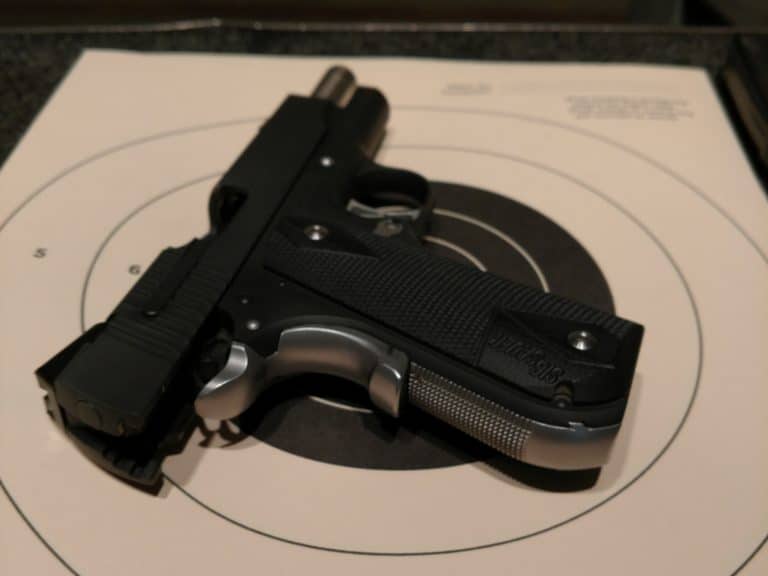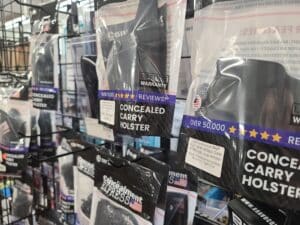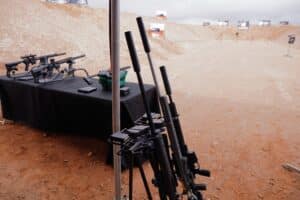Permitless gun-carry came closer than ever to becoming Pennsylvania law in 2021.
It passed the Pennsylvania House and Senate and was a veto from outgoing Governor Tom Wolf (D.) away from established policy. While it ultimately fell short, the 2021 effort was a high-water mark for the proposal that has been floating around the statehouse for about a decade. Its passage signals the fight is long from over.
The eventual outcome of that legislative wrestling could tell us what kind of legs the policy has in swing states and beyond.
That’s because Pennsylvania is different from most states that have adopted permitless carry. The most obvious contrast is Republicans don’t control the legislature and the governorship, as they do in most of the 21 who’ve adopted the policy. Pennsylvania is still purple and even saw four Democrats vote for the bill.
So, how did gun-rights activists get the policy all the way to the governor’s desk on the eve of an election year in a swing state?
First, momentum played a significant role. Five states adopted permitless carry in 2021, including Texas. Nearly all Republican-controlled states have adopted it to this point, and the handful of holdouts are experiencing immense pressure to do so. Florida Governor Ron Desantis (R.) and Georgia Governor Brian Kemp (R.) have committed to signing permitless carry legislation in the new year.
Pennsylvania House Judiciary Committee Chairman Rob Kauffman said the trend helped Republican leadership identify permitless carry as an issue they wanted to focus on.
“It was certainly helpful to me,” he told The Reload. “As I was working with my team and looking at initiatives that really had momentum to move forward that absolutely played a role.”
But momentum isn’t the only reason the bill finally made it through the legislature, according to gun-rights activists and legislators alike. There was also a concerted lobbying effort that spanned multiple gun-rights groups. And, unsurprisingly, they all want a piece of the credit.
While the state-based Firearms Owners Against Crime (FOAC) helped craft the bill and was vital in helping shepherd it through to final passage, national groups played a significant role as well–one with implications beyond Pennsylvania itself. The National Rifle Association and Gun Owners of America pushed for the bill. The groups all worked towards the same goal but used starkly contrasting approaches.
Representative Daryl Metcalfe (R.) succinctly described how a bill gets moved through a legislature.
“Legislation doesn’t happen overnight,” he told The Reload. “Legislation doesn’t happen in a vacuum or because it’s one man’s idea and that they’ve got the juice to do it. It’s generally the product of years of work, especially in the Pennsylvania legislature.
Every group involved celebrated the win–limited as it was. They each described it as something of a team effort. But, of course, each group also believes their efforts were perhaps the most valuable of all.
For the NRA and GOA, credit over the win could help in a larger struggle.
With the National Rifle Association hampered by infighting, a bankruptcy filing, and a corruption prosecution, smaller gun-rights groups are attempting to raise their profiles. The group, whose contribution and donation income still dwarfs all the other national gun-rights groups combined, wants to prove it remains as relevant as ever. It wants to show it can still pass bills in red and even purple states despite the adversity.
For its part, GOA is attempting to build a more influential lobbying operation. While it’s gained prominence as a harder-line alternative to the NRA through media appearances and voting advisories, GOA has never been able to compete with the size of the NRA’s dues-paying membership and its nationwide lobbying apparatus. However, it recently began putting further emphasis on the latter.
Hiring Val Finnell to head up its lobbying efforts in Harrisburg, Pennsylvania is perhaps the most prominent example of the new strategy. It’s one the group argues gives them a leg up.
“The NRA has largely been in absentia here. I’m walking the halls, and they’re on video calls,” Finnell told The Reload. “Having somebody in the capitol shoe leather walking around and advocating for pro-gun bills, it’s made all the difference.”
The NRA countered by pointing to the success of permitless carry in states across the country as evidence its reach is substantial across the country. It noted NRA CEO Wayne LaPierre was invited to the signing event in Texas when they became the 21st, and largest, state to adopt the policy last year. The NRA said they exerted the same effort to pass the bill in Pennsylvania as they’d done in dozens of other states.
“As the national leader in the constitutional carry movement, we were proud to have helped lead the effort in Pennsylvania on behalf of the hundreds of thousands of NRA members in the state,” Darin Goens, NRA Pennsylvania State Director, told The Reload. “The NRA spent months working with House and Senate leadership, bill sponsors, and committee chairs in Harrisburg to bring permitless carry to the Keystone State.”
The NRA said it held meetings with the majority leaders in both houses as well as the chairmen of each house’s judiciary committee to ensure the bill would move. The group said it helped secure at least a dozen votes for the bill that could have gone against it.
Several Pennsylvania lawmakers backed up the NRA’s assertion.
“The NRA has the largest influence when it comes to gun owners in Pennsylvania,” Kauffman said.
Metcalfe said the NRA has pushed for permitless carry in Pennsylvania since the movement first got underway years ago. He noted a number of different ways they provided support to him and others who’ve pursued the policy since the very beginning.
“The last ten years we’ve been working on constitutional carry the NRA has been there year in and year out, working with FAOC, working with the Second Amendment leaders in the Republican caucus, working with the citizen activist to come to the rallies and to help get some of those people to the rallies,” he said.
Metcalfe said the group has had less of a daily presence at the statehouse since it moved from dedicated staff lobbyists to contract lobbyists, but it ultimately deserves a lot of credit for the bill’s success.
“The fruit that we realized, putting us on the governor’s desk, was the result of many people’s labor for many years,” he said, “and the NRA has been part of that.”
But GOA’s supporters in the statehouse argued Finnell’s efforts were a bigger boon.
Senator Doug Mastriano (R.) said Gun Owners of America deserved credit for getting the bill through.
“GOA under Val did a fantastic job putting together a unified front for the GOP and even peel off a few Democrats as well,” he said. “So, the grassroots effort that he had across the state here was really impressive.”
Mastriano, who recently entered the primary race for governor after gaining a sizable following by becoming a prominent backer of former President Donald Trump’s (R.) claims a massive conspiracy stole the 2020 election, said he would push for the bill to become law if he becomes governor. He also said he hadn’t even heard from the NRA about the bill last year.
“I’ve got nothing against them; I just didn’t hear anything,” he said.
Doug Zubeck, a Republican staffer who has long served in the statehouse, agreed with the assessment. He most recently served Senator Mastriano until the senator was stripped of his staff by fellow Republican and Senate President Pro Tempore Jake Corman over Mastriano’s attempts to gain control of voting machines and other records as part of Trump’s efforts to overturn the election. He said GOA had become the leading force in state gun politics.
“The National Rifle Association, God bless them for what they’ve done, but the Gun Owners of America has taken it over in Pennsylvania,” Zubeck told The Reload. “That’s my humble opinion.”
He credited Finnell’s presence and persistence with GOA’s increased influence.
“I’m at work at 7:30 am, and we’d see Val coming across the main capitol building in the plaza walking in,” Zubeck said. “And then we look at each other like ‘wonder who he’s going to visit today.’ He wasn’t taking no for an answer.”
The debate over who deserves more credit for the bill’s passage is layered on top of an age-old debate over what lobbying tactics are most effective.
Finnell argued that while his presence in Harrisburg is meaningful, the group’s efforts to engage their supporters directly are a big reason he was effective. He said GOA sent more than a dozen email campaigns on the permitless carry effort and generated more than 29,000 messages from supporters to lawmakers while also partnering with Yong Americans for Liberty to do door knocking in critical districts. He described the GOA’s approach to lobbying as more grassroots-focused and confrontational than the NRA, which has long used its own massive grassroots reach to influence legislation.
“GOA is grassroots and constituent-driven,” he said. “Other organizations like the NRA, and some state groups, approach politics more as an access-based thing. They go, and they make friends with the politicians and what happens over time is there’s a drift.”
He said lobbyists are often taught to make friends with politicians in order to better influence them. But, he argued that approach can backfire.
“What happens over time is that you eventually become the representative of the legislature to your members, rather than the representative of your members to the legislature,” Finnell said. “And so, if you do that, then politicians will tell you what’s acceptable when they can run the bill when they can’t run the bill.”
Mastriano agreed with Finnell’s assessment.
“The simple dynamic is in a normal legislative year; most of these career politicians don’t want any hard votes,” he said. “They don’t want to vote on Second Amendment issues. They don’t want to vote on Pro-Life issues. They’d rather just vote on renaming bridges and what have you. That’s mostly what we do in Harrisburg, sadly.”
But what Finnell described as “access-based” lobbying, Kauffman described as “quiet diplomacy.” He said the NRA was instrumental in turning key votes using a softer touch. He said the NRA specifically focused on meeting with Republicans in southeastern Pennsylvania, a swing area, to convince them to get on board with permitless carry.
“I know a couple of them who sat down with the NRA, had real conversations, and ended up voting for it,” Kauffman said. “They wanted to widen the playing field rather than beat on folks who were already their allies. It was very effective.”
He said he has a friendly relationship with Finnell in addition to the NRA but noticed he “was maybe not using the same tact as the NRA.”
Metcalfe went further. He described Finnell as an active impediment to passing permitless carry and Mastriano as a first-term senator out of his depth.
“He’s caused a lot of confusion through his work, and he doesn’t really know what he’s doing,” Metcalfe said. “And people like Doug Mastriano, that are fairly new, also don’t know a whole lot of what they’re doing yet. He has hindered the process. He’s created a lot of confusion.”
He pointed to GOA endorsing an amendment from a Democratic lawmaker before backing off after realizing it would have slowed the progress of a gun bill. He also criticized Finnell and Mastriano for carrying on with a pro-gun rally despite threats levied against the event. He said Republicans in the legislature had a better working relationship with GOA before Finnell showed up.
“It’s been multiple instances where he’s just been a hindrance to our moving forward with our legislative initiatives because he kind of creates confusion within the process,” he said. “And he’s just not trusted by many of us to be a credible voice in any of the processes.”
Finnell admitted he had made a few minor mistakes during his relatively brief time in Harrisburg. But, he said Metcalfe’s harsh critique is the result of a “turf war.” He also noted the Republican had sought the group’s endorsement during his last election, argued he wasn’t “an effective legislator,” and said he was “glad he’s not running again” because he expects to have a better relationship with his successor. He also said Kauffman had cast doubt on the ability of Republicans to pass permitless carry before the session began and didn’t like Finnell responding by questioning the party’s commitment to gun rights.
“Legislators love to put your bill in. ‘Oh, yea. We’ll put the bill in. We’ll get co-sponsors. Oh yeah.’ Then they do nothing,” Finnell said. “But as soon as you start pushing, ask them to do something, ‘Oh, no, no, no.’ I mean, then all the excuses start happening. ‘It’s not the right time. We might lose our majority. We’ve got members in southeast Pennsylvania who may not want to vote on this bill because of their districts.’ You start pushing, then they get the excuses. So, every step you double down, and you keep pushing it. You don’t take no for an answer and, eventually, get it through.”
Mastriano described the argument GOA hurt rather than helped the permitless carry effort as a case of sour grapes.
“It doesn’t surprise me because by forcing people to do what they were elected to do, I mean, it’s too bad if feelings got hurt,” he said. “Sorry, not sorry.”
Finnell argued the bill’s passage was evidence he was right to confront Republicans, and the GOA style works better than the alternatives.
“They were used to the NRA and the FOAC way of doing things which is access base, and you let the politicians tell you what’s acceptable, and then when a new paradigm comes in, people don’t just they can’t get used to it,” he said. “But look, we’ve achieved results this year, all of a sudden.”
In the end, everyone agreed the upcoming election to replace Governor Wolf will determine whether or not permitless carry ever makes it across the finish line in Pennsylvania. The NRA called it a “perfect example of why Pennsylvania voters need to elect a pro-Second Amendment Governor in 2022.” Kauffman said the Republican-led legislature would be sure to pass the bill again if a “pro-freedom Republican governor” is there to sign it.
If that does come to fruition, the debate over which tactics work best and who deserves the most credit will begin again.







Only Members can view comments. Become a member today to join the conversation.